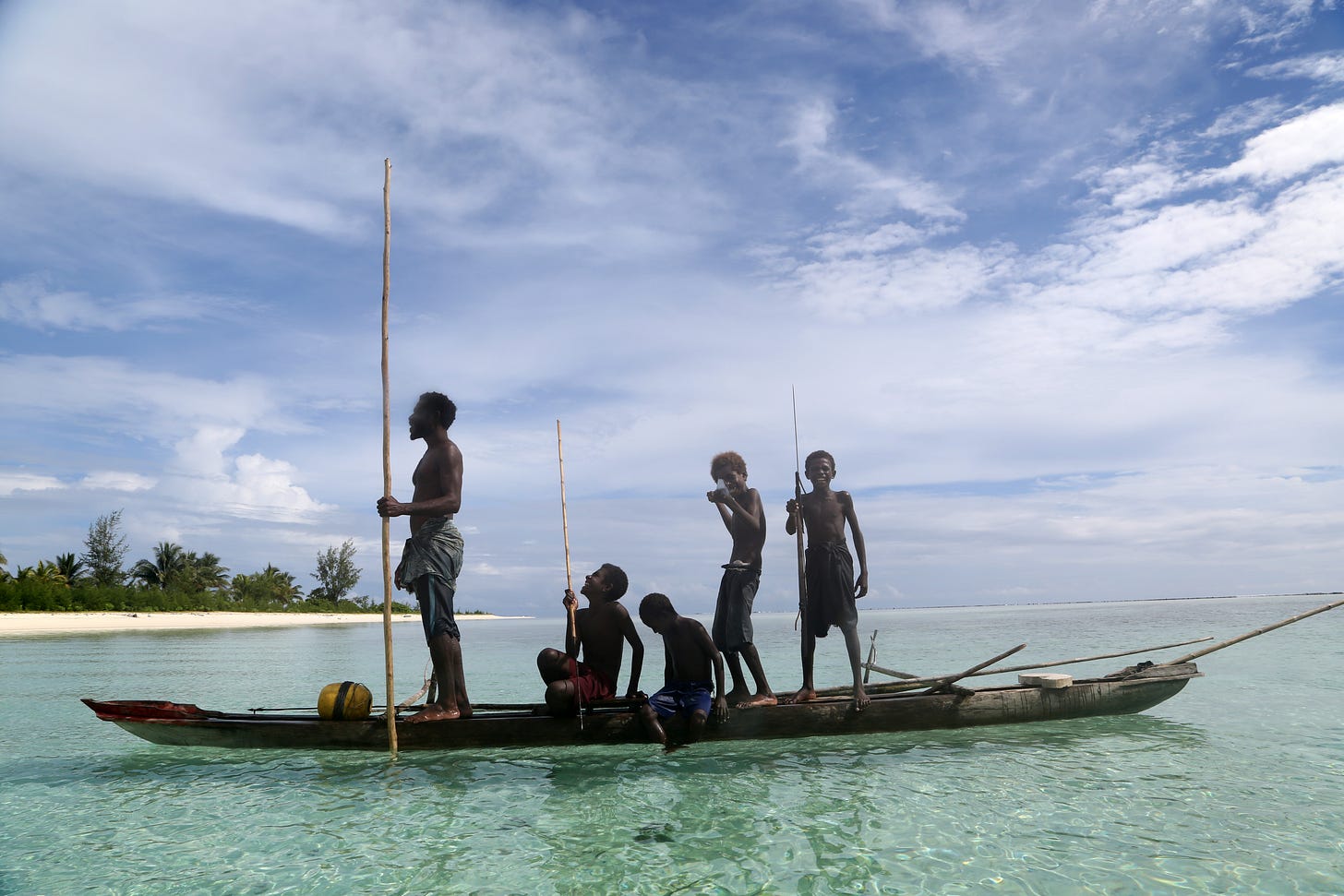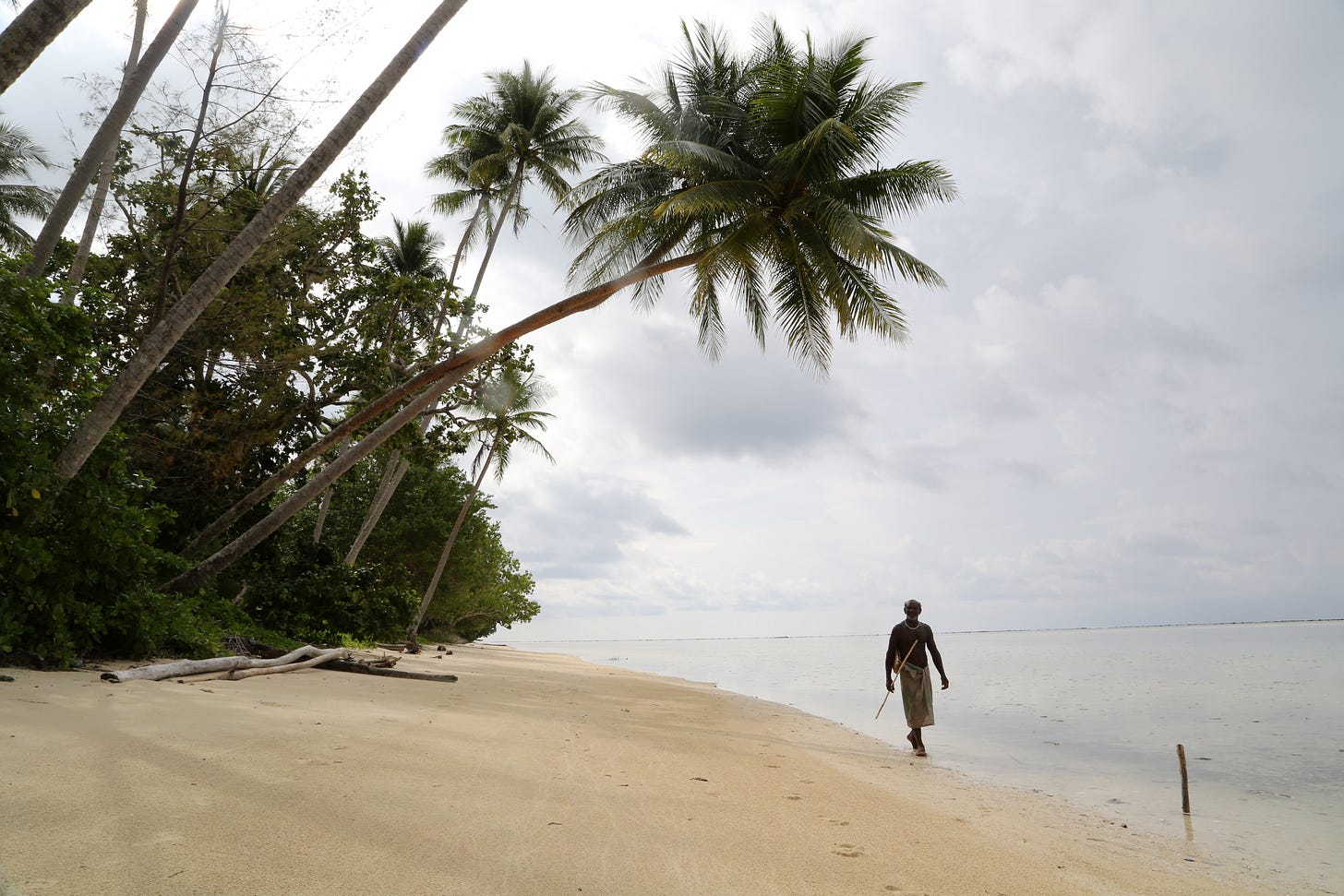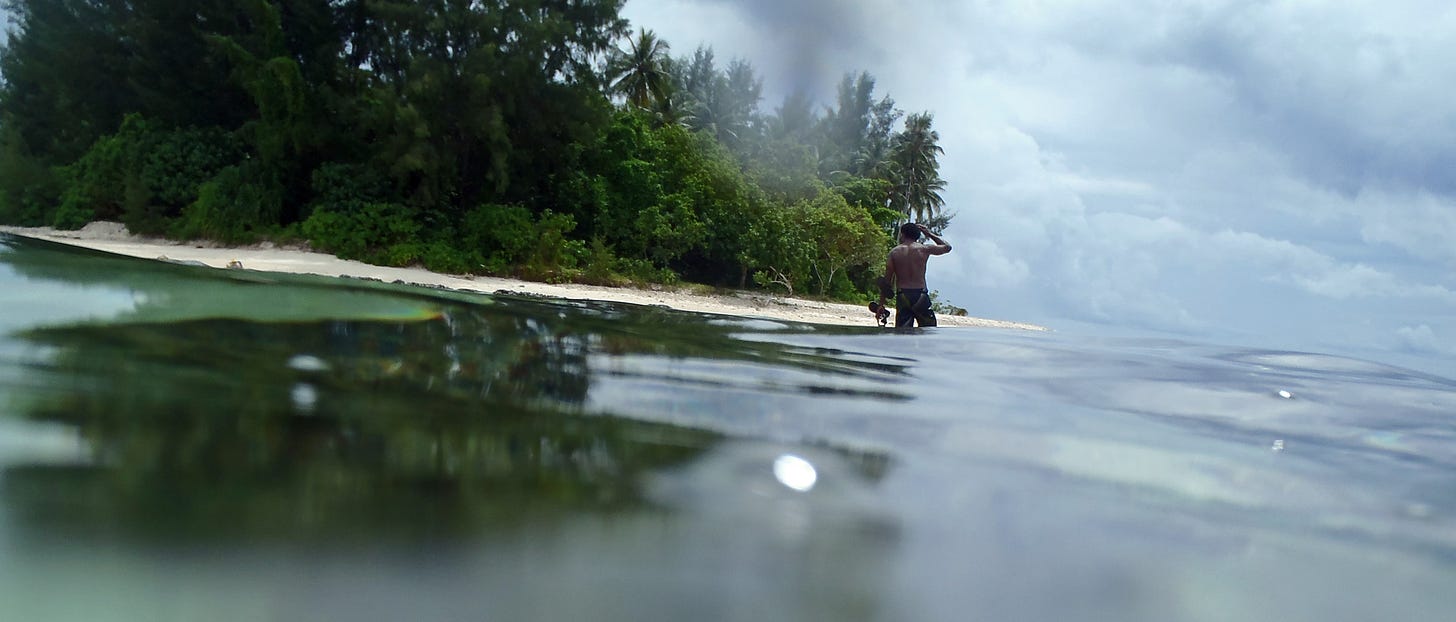I want to be alone
27 October 2022: The seven largest oil companies in the world have reportedly made over $150 billion in profits so far this year.
25 October: A UN report declares that it is ‘now or never’ to take action on climate change. If we don’t change our lifestyle, the planet will change it for us, painfully.
In 2013 I travelled through the Tigak archipelago in Papua New Guinea and found a man who had escaped the madness of humanity.
It was still dark when Moses came to wake me up. Starlight was skittering across the waves and a few giant fruit bats were heading towards the middle of the island. We went down the beach to where the other local guide, Tony, was waiting. They had a rough hand-drawn map of the islands and I had to decide where we would go. With a battered index finger, Moses pointed out Nusa Island, a tiny atoll off the northern tip of New Ireland. ‘That’s where we are now.’
Beyond it, in a 40-mile northward arc, was a string of islands: the Tigak archipelago. I followed Moses’s finger as he pointed. ‘Good snorkelling here. Nice island, that one. Place to sleep here.’
His finger stopped at a larger island, Tsoilik, an oval bisected by a curving creek. ‘We can finish here.’ But my eye carried on along the crooked line of the reef to one more island – the island at the end of the world.
‘What’s this one?’
Tony laughed uneasily. ‘That’s Nemto. Let’s not go there. It’s a bad place, full of ghosts.’
But Moses was from the Papuan highlands and the ghosts of Nemto didn’t bother him. He measured out the route in paddling sessions and overnight stops. ‘We could paddle there, but it’s a long way back. We’ll need to borrow a motorboat on Tsoilik for the return. We can do it.’
We went out on the beach and sorted the kayaks. In the channel, a Chinese logging ship was sliding away to the north-west, heading for New Hanover, a larger island to the west of the Tigak group.
We skirted Nusa then set a course towards Nubils, our first night’s stop. Dolphins cut across our bows and a turtle popped up to take a look. By lunchtime, we had reached a deserted, jungle-covered island, where we swam off the reef. I was struck by the quantity and quality of soft corals waving in the currents, each inhabited by an orange clown fish. The destruction that had hit the Great Barrier Reef had not yet arrived here. Further out, the creatures became more deadly: a lion fish drifted along and, in the gloom, a gang of sharks.
Reaching Nubils that afternoon, we worked our way around the jungle shore to a small sheltered beach where we found Moses’s friend, Gordon. He was sitting on a log mending a fishing net. Darkness fell abruptly with an immense stillness on the water. Gordon lit a lamp inside the palm-thatched shelter and made dinner: a soup of papaya and mangrove snails followed by some small scarlet fried fish with sago, a wild tree that is felled and gutted for its starchy interior. I went to bed, fell asleep and woke an hour later to booming rock music. A battered old radio was blaring heavy metal rock, but Gordon and Moses were both fast asleep. I turned it off and they both woke up ‘Hey, we can’t sleep without it!’
Next day we paddled to Anelaua, the largest of the archipelago. As we approached I could see movement up on the hill, people running around excitedly. ‘It is now a school,’ Moses told me, ‘But years ago it was a leper colony.’
There was a dilapidated jetty where we left our canoes and set off along a rough trail through the forest, but we had barely gone a hundred metres when the bushes suddenly leapt up at us and we were surrounded by yelling, screaming warriors, brandishing spears, their faces daubed with paint. Moses, I realized, had known this would happen and was enjoying my shock. ‘It’s their greeting,’ he laughed. ‘Now you must say why you are here.’
Eventually we were led across the island to some buildings in a clearing and a welcoming party of teachers: Gabriel, Enoch and Alice, the head mistress. Enoch was keen to explain that the people here were not, and never had been, cannibals. ‘I don’t want the world to have a wrong impression.’
The students gave me a tour, telling me tales of their island. The buildings mostly dated back to 1912 when the Germans came and established a leper colony. In WWII there had been some excitement when a Japanese warplane had crashed into the sea and two airmen were captured. Their parachute silk was made into sails for the outrigger canoes. The lepers stayed until the 1960s when it became a vocational college.
Two of the students knew where the Japanese plane lay – in about 12 metres of water offshore – so we paddled out and dived down to have a look at the intact fuselage and twisted propeller: the cockpit was full of small fish and a large yellow coral was blooming on the fuselage. After three dives, I could do no more and headed back to the kayaks.
Squalls of rain were dodging around us as we left Anelaua. Our objective was a narrow creek between two islands, where a handful of palm-thatch huts sat on a narrow strip of white sand and a clutch of outrigger canoes were drawn up. The people on these islands make a simple living from fishing and few people come to visit. At night they can see the lights of big ships: Chinese and Malaysian timber boats heading for New Hanover which is being pillaged for timber. The people on the islands do not pillage. They would scarcely register on any measurements of consumerism. Their idea of a luxury product is to beg a scrap of newspaper off a boatman and roll it up with some homegrown tobacco then hunker down on the beach and puff contentedly.
After a dinner of huge crabs, we sat under a thatch shelter and our host, an old lady called Oliparanis, proceeded to tell us about the giant sea snake Tunga Tunga Kang who lived up a narrow creek opposite. This monster was a masali, a spirit creature, who was a totem animal for a local clan.
All the clans, she explained, were named after birds. She herself was a yellow sunbird. Other people were red doves, crows and hawks.
‘In our country we also have hawks and crows,’ I said to her, ‘And a few doves - but no sunbirds.’
The island spirits, the masali, she explained, were sea creatures like squid, octopus, shark and snake. The spirit of this island was an octopus who moved at night and lived in a cave. Out on the reef another spirit was the giant sea snake and anyone who wanted to explore that reef had better ask the local shaman to speak to that spirit first, to get permission. Once an American had come and dived on that reef without performing this necessary task. He had died inside one of the WWII shipwrecks that lay out there.
What about the masali on Nemto?’
She shuddered. ‘That one is very bad. No one lives there.’
The closest translation of the name, Nemto, that she could think of was, ‘something lives’.
Next morning, we set out late and paddled all day along the islands to the north of Tsoilik. Big swells were slapping over the reef and Nemto looked a long way off. ‘Better we use the motor boat,’ said Tony. On one small island we found Manu who owned a fibre glass boat with an outboard engine.
We set off, Manu guiding us out into the ocean and past the wreckage of a 1940s Japanese warship. An hour or so later, we reached Nemto and, passing through a narrow gap in the breakers, crossed the lagoon and ran up on the jungle-backed beach.
We walked along the shore, dodging under giant tree boughs that had come to rest on the sand. Each was laden with orchids and other epiphytic plants. We came across the rotting carcass of a washed-up sperm whale, which was slowly disintegrating to reveal the massive skull. I tried to lift its giant lip with a stout stick, searching for its precious teeth, but was beaten back by the stench.
On the far side of the island we had a shock. A man.
He came strolling towards us, wearing just a sarong and carrying a homemade basket over his shoulder containing his tobacco and betel nuts. His name was Ansalem. He was 62 years old and had come to Nemto to live with his wife. He wanted to get away from people. ‘They are always fighting and arguing about everything.’
Wasn’t he afraid of the spirits?
He shook his head. ‘I have seen the masali here. It’s a snake with a man’s head.’
Ansalem was unafraid because his family carried the ability to see spirits. His great grandfather had been a powerful shaman, able to turn himself into a pig. The masali also had that ability to shape-shift, but Ansalem knew how to make peace with the spirit and live alongside it. His method was to tread very lightly: never taking much from the island.
‘Would you go back to living in a village?’
‘Never!’ he scoffed. ‘Look at me. I eat fresh fish and crabs every day. There’s fruit from the forest and I drink coconut water when I’m thirsty.’
‘Don’t you miss people?’
‘Fishermen come here. I talk to them. I exchange dried fish for things I want – rice, salt and soap.’
Together we explored his island. There were Red-Flanked Lorikeets, tiny parrots, in large flocks; there were several types of kingfisher and the beach was busy with many wading birds. Deep in the jungle interior, he showed us a narrow creek. Barely two feet wide it was absolutely clear and in it swam fish as long as my forearm. Their silver sides were flushed scarlet on top with a beautiful scattering of colourful dots. Ansalem called them coral trout. ‘I never eat them. They belong to the masali.’
‘In this
same creek I found diamonds,’ he said, rummaging inside his basket and pulling out a scrap of newspaper which he unfurled. Inside were some glass balls. I examined them. They were certainly not diamonds. They looked like volcanic glass.
‘Where exactly did you find them?’
‘In an bag in the creek. It was from the War – Japanese soldier bag.’
I suddenly realized what they were: marbles.
At the far northern tip of the island, Ansalem showed us where he had found graves, but not from WWII. ‘These are the graves of the Kotkot people, who lived here long ago. They all died of a disease carried by rats.’
This, I realized, was the probable explanation of Nemto’s ghostly reputation: it had been abandoned after a plague that came with European explorers in the 17th century – outsiders who stumbled into this idyll and destroyed it. But now, ironically, all these years later, it had become an idyllic spot. Human superstition had protected it and nature reclaimed it.
Arriving back at our boat, we sat in the sand and shared our food. Tony had some white-bread sandwiches and an alarmingly colourful powdered drink called Tang. Ansalem’s wife had appeared bringing fried fish and green coconuts. Her offerings were the tastier, and neither she nor Ansalem touched ours. When we came to leave, I wanted to give them a present, but nothing in my bag seemed remotely useful for a pair of self-sufficient castaways, so I gave them some cash. He seemed pleased. ‘We’ll buy cloth from the fishermen.’
From the boat, I watched Ansalem and his wife strolling along the beach to their cabin, two ageing Robinson Crusoes chatting, string bags thrown casually over their shoulders. They had, apparently, forgotten about us already.









Magical. Not only did the man find an island he could readily live on, he found a wife that would accompany him in solitude.